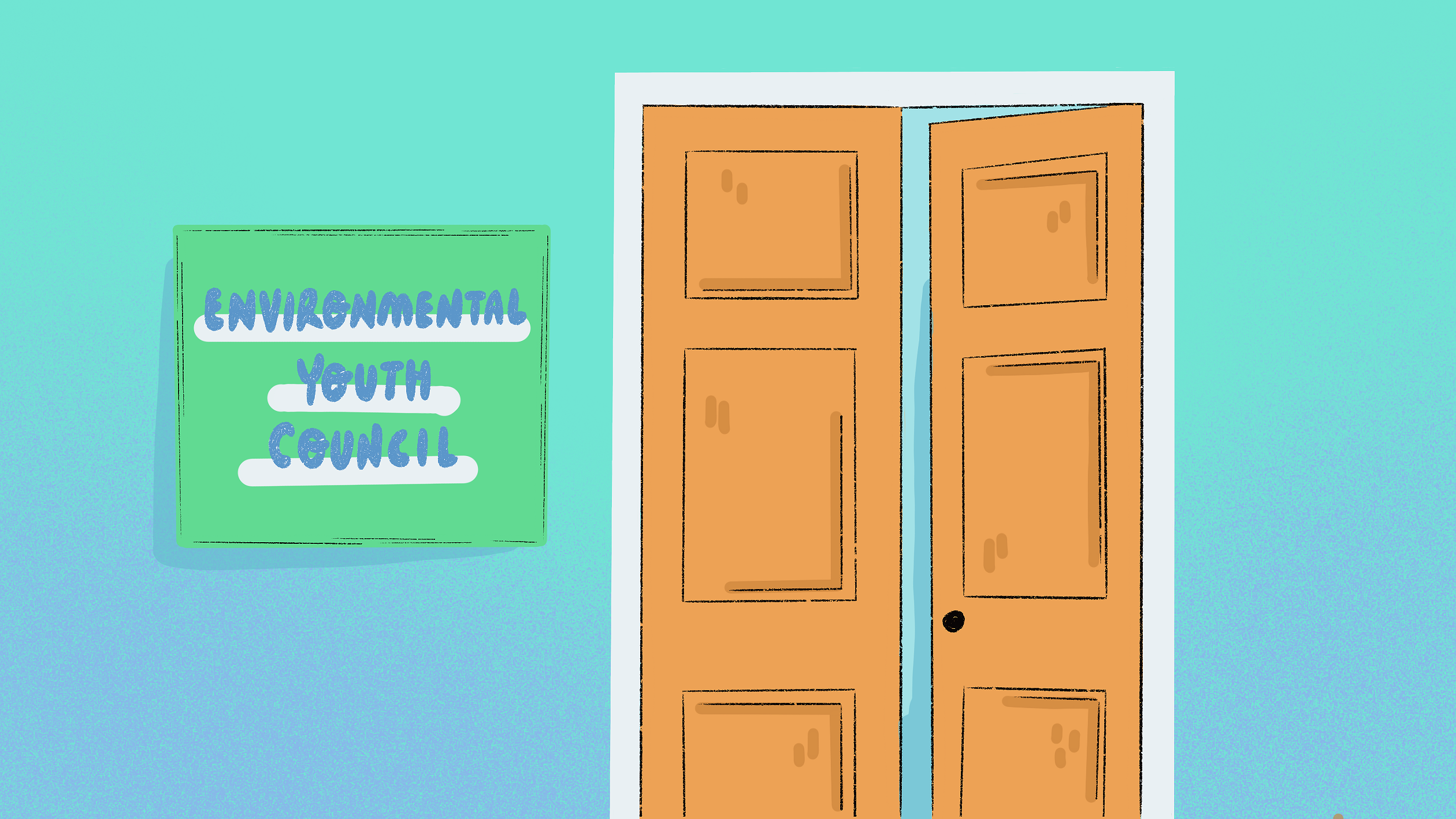
Illustration by Daniela Nunes
How to involve young people with environmental issues at the European level
Youth involvement in the Netherlands
by Katariina Järve
The Youth Environmental Council of the Netherlands (YEC) (Jongerenmilieuraad) was founded two and a half years ago and they now have more than 80 members. The main motivation for creating a council like that was to increase young people’s involvement in the decision-making processes regarding the environment. One of the founders of the YEC, Peter Akkerman, stressed that there was a need to change the way of involving young people in politics. “There will be a meeting, there will be a picture, and then they will kick the youth out of the door – end of the story, but I said no, I want to do this differently.”
This was the moment when Peter’s idea of having young people meaningfully involved every step of the way started to turn into a reality. During the first year, the YEC did a lot of promotional work which involved podcasts, articles, magazines and conferences. Besides that, they started writing up environmental policies. At the beginning of 2023, the YEC published a participation tool that tells young people about environmental problems and collects their opinions.
YEC not only educates young individuals but also actively engages them in policy matters. This group of young participants collaborates with the government, actively discussing policy issues and crafting proposals.
The YEC brings together knowledge from academia and from young people across the country. To form environmental policies, the YEC working group on policy writing speaks with experts and young people. Sometimes the YEC forms participatory groups to gather input and the above-mentioned virtual participation tool makes gathering young people’s input much easier.
Today, the YEC works closely with other youth organisations in the country and gives input to different youth representatives, such as the United Nations Youth Delegate Programme. One of the young activists at YEC, Olivier Roekens, thinks that many organisations are fighting for the environment now and that is why the relatively young YEC needs to find its place in all of that. “We are still trying to see where we can co-operate because we mostly want the same thing,” he said.
Youth involvement at the EU level
Now that things are going well with youth involvement in environmental issues in his homeland, Peter has an eye on a bigger goal – to make a platform for young people to be involved in the decision-making processes at the European level. He first brought up this idea during a panel discussion at the Sustain-Mobility conference (26.02. - 01.03.2023, Schloss Hohenkammer - near Munich, Germany. The idea is quite new in the field because, in recent years, youth involvement has been increasing at the EU level, but specifically environmental issues are not yet directly discussed with youth. Later, YEC collected the contact information of young people interested in the creation of this European-level body.
There is already an international network called Youth Climate Council Alliance which brings together youth climate councils. The Alliance has eight member countries right now: Brazil, Costa Rica, Kenya, Uganda, the Netherlands, Poland, Denmark and Ghana. The main goal of the Alliance is to share experiences and learn from each other.
A similar thing should be done at a European level, said Olivier from the Netherlands: “We want to achieve one council on the European level because the policy on the European level affects the national level as well.”
When it comes to international networks and bodies it is obvious that there are regional differences. Peter thinks this is not a problem. “The European Union needs to know information, even if there is no interest in some countries in the environmental topics, it means that they can allocate funds to these countries,” he said.
Young people from different countries think that the initiative is good work and is important. “I think that it’s important to bring the youth to the table,” says Ewan Lewis from the youth wing of the Scottish Greens party. He also thinks that climate change is intersectional and that is why it is important to involve young people. “Youth should be involved and really listened to, not what some politicians do as youth washing where they post a picture with young people and say that youth was involved,” he said.
For a young activist from France, Mathilde Maindrault, the most important topic in involving young people at the EU level is credibility. She explains that most of the time society understands that young people are worried but they don’t take their concerns seriously. “‘Oh, but you are young and not wise’ is what they usually tell us but at the end of the day it’s my future too,” she said.
How to truly involve young people
“At first you have to talk with young people to find a way of involvement that suits them,” said Peter when asked about how to start. He stressed that often governments like to say that they are involving young people, but if the ways of involvement are not suitable for them it doesn’t matter and it doesn’t have an impact. It is clearly noticeable that there is also an interest in hearing what young people think from the EU side, looking at the efforts made through the EU Youth Dialogue.
The second pointer given by Peter is to speak the language of young people. “If governments use complicated words and only speak about things they cannot do, young people will not be either excited or motivated.”
Young activist Olivier said that collaboration with policy makers works because the fundamental knowledge and beliefs are the same. “We work on the ground that there is climate change happening and that is the foundation on which we can build policies,” he said.
Starting with a youth council
The council in the Netherlands started when Peter, as a policy maker and activist, introduced the idea of forming a council at a youth event. Not much was needed; he only asked those who were interested to contact him. Around 20 young people got in touch with him after the event and five of them started actively working on forming the Youth Environmental Council. “You don’t have to start big – just start,” he said.
As a young person, the first step would be meeting like-minded people. “The best way is to be engaged, talk to people, and then through people and organisations you meet you can start your organisation,” recommended Olivier. From his personal experience, he also knows that there will be lots of people saying “no” but if youth are persistent enough, they will eventually get a positive response.
How easy the creation of such an organisation or a group is depends a lot on the national context. Olivier recommends exploring the possibility of starting at a local level first, since this might be easier. It can start with one city and then use the example of that city to create more councils in different cities. Ultimately, local councils can start working together to create something at national level. This might help in situations where going straight to the government does not work or is not an option at all.
Somewhere at the beginning of establishing a council one must decide on two fundamental questions. The first is whether the council will be working closely together with the policy makers or politicians. The council in the Netherlands speaks with policy makers about where young people can be involved in the writing process. A similar council exists in Denmark, but they work together with politicians who vote on the policies but do not take part in the writing processes. In Olivier’s opinion working with politicians can be challenging. “The problem with talking with politicians is that they need to take the picture with young people and post it and that is when they are already satisfied – this makes it hard for young people to make sure that they actually have an impact on the country’s policy,” he said.
The second fundamental question is whether the council will take part in politics or stay neutral in that sense. The YEC in the Netherlands has decided to stay out of politics and work together with policy makers. That makes it easier for them to discuss policy with different stakeholders. First, the benefit of staying out of politics is that it is much easier to work with different parties since political situations can change rapidly. Secondly, most of the policy is written by the policy makers not the politicians so it is easier for young people to get their ideas straight into the policy document.
Olivier has already seen the positive effects of the YEC. “The people we met were amazed when they saw us and heard about what we were working on,” he said.
One of the problems that young people might face along the way is a lack of motivation. To keep motivation up, it’s important to think through who and what benefits from the work done in the council. “What has helped me stay motivated is knowing that I’m not only doing this for young people, I’m doing this for the whole country,” said Olivier.
In conclusion, it is vital to involve young people in policy making. One of the ways is to create a council which brings together young people who are willing to represent their thoughts in the policy-making process. National councils already exist in several countries but the European Union level lacks such a body. Looking ahead, we should understand that young people have great ideas and can help shape our future. By creating a European council for young people, we can make sure their voices are heard.

Katariina is a young aspiring journalist who passionate about youth rights.


